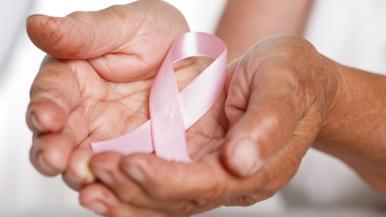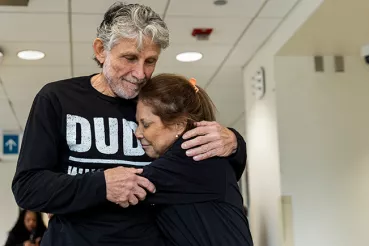After Karen Arp got a phone call from her doctor with the news she had breast cancer, she went back into a meeting with a client and finished a training session.
Then she cried.
"After that, I went into problem-solving mode," says Arp, 61, who has done plenty of troubleshooting during tough times in her job as an outplacement counselor for laid-off employees. "During this whole journey, I've tried to turn things around and make it into a positive instead of negative experience."
First things first: Fight the disease
Doctors initially detected Arp's cancer during her annual mammogram two years ago. A needle biopsy followed by an MRI screening determined that she had stage II breast cancer, meaning the cancer cells had spread to her lymphatic system.
"When you go through something like this, you learn a lot about yourself and how much strength you have," she says. For treatment, Arp turned to cancer specialists at the Coleman Foundation Comprehensive Breast Cancer Center at Rush University Medical Center on the recommendation of her primary care physician at Rush.
"You have options, and you need to form the best medical team you can," Arp says. "Do your homework and get a second opinion. Read up on things even though you may be afraid of what you'll learn. Write down your questions before you even go to the doctor. Bring someone with you. Take notes during the appointment, then sit down and process the information afterward."
Choosing an approach
Patients like Arp who come to the Coleman Foundation Comprehensive Breast Cancer Center meet with a team of experts — including a medical oncologist, a radiation oncologist, a surgical oncologist and a psychologist — during their initial visit. Additionally, radiologists and breast pathologists provide expert evaluation and second opinion services. These dedicated professionals work collaboratively with each patient to create an individualized treatment plan at the initial visit.
Although tumors were found in only one of Arp's breasts, after consulting with her care team she chose to be proactive and undergo a double mastectomy. "I wanted to eliminate any chance of cancer developing in the other breast," she says.
Immediately afterward, Arp underwent breast reconstruction. To help prevent the cancer from coming back, she later went through a three-month course of chemotherapy under the guidance of medical oncologist Ruta Rao, MD.
Knowing she would lose her hair, she went to a wig shop with a friend who also was going through chemotherapy. "She brought a bottle of champagne and toasted having no more bad hair days," Arp says. "There were no tears, there was just a celebration of hope."
Managing everyday life
Treatment didn't make Arp ill, but it did leave her tired. After spending years traveling from Sunday through Friday to coach her clients on their job searches, she continued to work but scaled back with fewer clients and less travel.
She also had to pace herself as she performed everyday tasks. "I would stock up on things prior to my chemo treatment, and if I had to go to the store during the days after it, I would walk slowly and take deep breaths," she says.
When you go through something like this, you learn a lot about yourself and how much strength you have.
Staying strong
Now undergoing follow-up care, — with physical exams every three months and CT screenings every six months — Arp continues to focus on solving the problem. She stays strong mentally and physically by taking the following steps:
- Participating in a support group. Arp recommends this step for anyone with cancer. "I was able to share my concerns without having to keep up a brave face," she says. "It took away a lot of my fear and gave me a lot of assurance."
- Exercising regularly. Arp takes a class with a trainer who specializes in working with cancer patients and adjusting to the restrictions caused by their treatment. She makes Arp exercise while she's traveling on business as well, something that in the past she ignored.
- Maintaining a healthier diet. Arp now eats more fruits and vegetables, more chicken and fish, and less red meat. She also avoids diet soda, explaining: "I wanted to cut out the chemicals in diet drinks."
- Meditating. Arp has taken meditation and yoga classes to keep her mind at ease, and she is looking into a self-hypnosis class to help her further with stress management. "Mentally, I am much calmer than I've ever been," she says.
To date, there's been no sign of cancer recurrence. "I've decided that I will recognize cancer, but I won't let it take a hold of my life," Arp says. "I choose to focus on all the positive things I can do to fight against getting it again."




